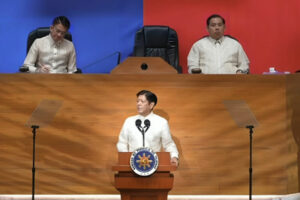LAWMAKERS in the 19th Congress have made progress on reforms, but legislative gaps remain in addressing structural challenges, such as food security and job creation, analysts said over the weekend.
There were also “missed opportunities” in passing bills that could have supported small businesses, strengthened human capital and backed the clean energy transition, said John Paolo R. Rivera, a senior research fellow at the Philippine Institute for Development Studies.
“Critical gaps remain, and legislative action often lagged behind the urgency of structural economic concerns,” he said in a Viber message. “The 20th Congress has a critical window to reinforce structural reforms that were deferred or delayed in the 19th Congress.”
Mr. Marcos has outlined an agenda for the 2022-2025 Congress aimed at boosting foreign investment, advancing education reforms and strengthening agriculture, as his administration sought to drive economic growth in a country pummeled by the coronavirus pandemic.
The first three years of the administration were, however, plagued by concerns about economic stagnation and governance missteps, after missing growth targets in the past two years.
“If there is another area that lawmakers have missed, that would be on the long-term economic welfare of the country,” Reinielle Matt M. Erece, economist at Oikonomia Advisory and Research, Inc., said in a Viber message, citing a lack of effort to push for agriculture reforms.
“Although rice tariffs were relaxed to improve the country’s food supply, especially on rice, they forgot to tackle long-term food security or aggressive improvements with the country’s agricultural sector,” he said.
The government in July 2024 slashed tariffs on rice imports to 15% from 35% until 2028 to keep prices in check, but legislative efforts to amend the agrarian reform law stalled in congressional committees, leaving the key agriculture reform proposal in limbo as the 19th Congress is ending.
Lawmakers are set to resume sessions on June 2 for their final two-week stretch, marking the final opportunity for senators and congressmen to finalize pending legislation before the new congressional session begins in late July.
The House of Representatives has passed almost all key reforms set by President Ferdinand R. Marcos, Jr. for the 19th Congress, according to Speaker Ferdinand Martin G. Romualdez, ranging from laws setting the country’s territorial boundaries to taxes on digital services, among others.
In a statement on Sunday, Mr. Romualdez said the chamber will approve on final reading measures outlawing the Philippine offshore gaming operations and update the Philippine civil registry act.
The House will also pass the following bills on final reading: the declaration of state of imminent disaster; the institutionalization of emergency assistance for individuals in crisis; and the proposed expansion of senior citizen benefits and privileges.
“Better transparency and anti-corruption laws should also be pushed to avoid misuse of the country’s taxes, especially after raising them more with the new value-added tax (VAT) on digital services,” said Mr. Erece.
The government started enforcing the 12% digital tax on June 1, after Mr. Marcos signed the law in October of last year. It’s expected to generate about P102 billion from 2025 to 2028, based on the Finance department’s estimates.
‘BOLD MEASURES’“Congress has poorly addressed major economic concerns like inflation, job creation and foreign investment,” Jose Enrique “Sonny” A. Africa, executive director of think-tank Ibon Foundation, said in a Viber message.
There needs to be “bold measures” to boost the country’s agriculture sector and industries to help make food cheaper and create more jobs, he said, noting that lawmakers remain fixated on “free market-oriented economic thinking” as other nations are adopting protectionist policies.
“The dominance of pro-market ideology in Philippine lawmaking means that economic laws keep prioritizing capital and profits over labor and people, and focus on foreign investors over national development goals,” he added.
Lawmakers should consider imposing “wealth taxes” to help fund government programs amid a shrinking fiscal space, Leonardo A. Lanzona, an economics professor at Ateneo de Manila University, said in a Facebook Messenger chat.
Finance Secretary Ralph G. Recto last year said he is not in favor of a wealth tax, citing it could be counterproductive.
The Congress also failed to pass key energy sector reforms, including proposals to establish a strategic petroleum reserve, modernize grid infrastructure and streamline renewable energy permitting, said Noel M. Baga, convenor of think tank Center for Energy Research and Policy.
The 20th Congress should focus on enhancing the Energy Regulatory Commission’s (ERC) powers, he said in a text message.
Systemic political reforms also stalled during the first three years of Mr. Marcos’ presidency, said Ederson DT. Tapia, a public administration professor at the University of Makati.
“The 19th Congress has tackled pressing issues; yet, profound systemic reforms, particularly those necessitating redistribution of power among institutions — an anti-political dynasty law — are still unrealized,” he said in a Facebook chat.
Arjan P. Aguirre, who teaches political science at the Ateneo, said while there were measures that advance the interest of some sectors, Mr. Marcos’ first three years “did not really make a last ting impact on strengthening democratic institutions.”
He said bills seeking to strengthen the Commission on Elections, institutionalize political party development and judicial reforms have taken a backseat amid a political spat between the Marcoses and Dutertes.
“They were distracted by their own misguided political maneuverings and infighting,” he said in a Messenger chat.
The first half of Mr. Marcos’ presidency saw him facing political shifts due to a deepening feud with the Dutertes, which culminated in the impeachment of Vice-President Sara Duterte-Carpio and subsequent arrest of his predecessor, Rodrigo R. Duterte over alleged crimes against humanity charges. — Kenneth Christiane L. Basilio
